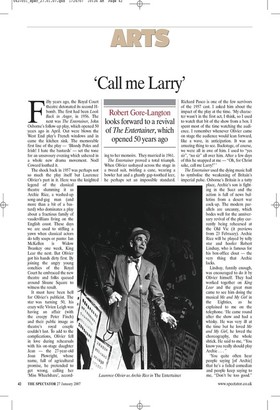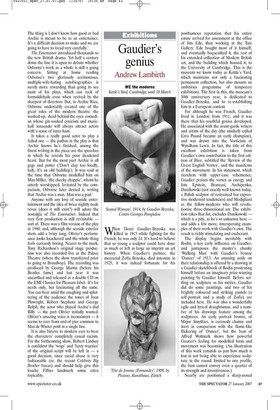'Call me Larry'
Robert Gore-Langton looks forward to a revival of The Entertainer, which opened 50 years ago Fifty years ago, the Royal Court theatre detonated its second Hbomb. The first had been Look Back in Anger, in 1956. The next was The Entertainer, John Osborne's follow-up play, which opened 50 years ago in April. Out were blown the West End play's French windows and in came the kitchen sink. The memorable first line of the play — 'Bloody Poles and Irish! I hate the bastards' — set the tone for an unsavoury evening which ushered in a whole new drama movement. Noel Coward loathed it.
The shock back in 1957 was perhaps not so much the play itself but Laurence Olivier's part in it. Here was the knighted legend of the classical theatre slumming it as Archie Rice, a washed-up song-and-gag man (and more than a bit of a bastard) who dominates a play about a fractious family of vaudevillians living on the English coast. These days we are used to stifling a yawn when classical actors do telly soaps or panto: Ian McKellen is Widow Twankey one week, King Lear the next. But Olivier got his hands dirty first. By joining the angry young conchies of the Royal Court he embraced the new theatre and folks queued around Sloane Square to witness the result.
It must have been hell for Olivier's publicist. The star was turning 50, his crazy wife Vivien Leigh was having an affair (with the creepy Peter Finch) and their public image as theatre's royal couple couldn't last. To add to the complications, Olivier fell in love during rehearsals with his on-stage daughter Jean — the 27-year-old Joan Plowright, whose name, full of agricultural promise, he pretended to get wrong, calling her 'Miss Wheelshare', according to her memoirs. They married in 1961.
The Entertainer proved a total triumph. When Olivier sashayed across the stage in a tweed suit, twirling a cane, wearing a bowler hat and a ghastly gap-toothed leer, he perhaps set an impossible standard.
Richard Pasco is one of the few survivors of the 1957 cast. I asked him about the impact of the play at the time. 'My character wasn't in the first act, I think, so I used to watch that bit of the show from a box. I spent most of the time watching the audience. I remember whenever Olivier came on stage the audience would lean forward, like a wave, in anticipation. It was an amazing thing to see. Backstage, of course, we were all in awe of him I used to "yes sir", "no sir" all over him After a few days of this he snapped at me — "Oh, for Christ sake, call me Larry!"' The Entertainer used the dying music hall to symbolise the weakening of Britain's imperial pulse. Osborne's Britain is a tatty place, Archie's son is fighting in the Suez and the action is full of news bulletins from a desert war cock-up. The modern parallels are uncanny, which bodes well for the anniversary revival of the play currently being rehearsed at the Old Vic (it previews from 23 February). Archie Rice will be played by telly star and hoofer Robert Lindsay, who is famous for his box-office clout — the very thing that Archie lacks.
Lindsay, funnily enough, was encouraged to do it by Olivier himself. They had worked together on King Lear and the great man came to see him doing the musical Me and My Girl in the Eighties, as he explained to me on the telephone. 'He came round after the show and had a whisky. He was very ill at the time but he loved Me and My Girl, he loved the choreography, the whole shtick. He said to me, "You know you really should play Archie . . . "
'You quite often hear people saying [of Archie] that he's a failed comedian and people keep saying to me, "Don't be too good."
The thing is I don't know how good or bad Archie is meant to be as an entertainer. It's a difficult decision to make and we are going to have to tread very carefully.'
The Entertainer introduced thousands to the new British drama. Yet half a century down the line it is open to debate whether Osborne's work as a whole is still a going concern. Sitting at home reading Osborne's two gloriously acrimonious, multiple-wife-hating autobiographies is surely more rewarding than going to see most of his plays, which can reek of formaldehyde even when revived by the sharpest of directors. But, in Archie Rice, Osborne undeniably created one of the great roles of the modern theatre: the washed-up, dead-behind-the-eyes comedian whose gin-soaked cynicism and musichall innuendo will always attract actors with a sense of inner ham.
It takes a really good actor to play a failed one — the pathos in the play is that Archie knows he's finished; among the finest writing in the piece are the speeches in which he reveals his poor deadened heart. But for the most part Archie is all gags and patter (Don't clap too loudly, lady, it's an old building'). It was said at the time that Osborne modelled him on Max Miller, 'the cheeky chappie', whom he utterly worshipped. Irritated by the comparison, Osborne later denied it, writing that 'Archie was a man. Max was a god.'
Anyone with any love of seaside entertainment and the idea of twice-nightly nude revue (does it still exist?) will adore the nostalgia of The Entertainer. Indeed that very first production is still revisitable — sort of. There was a film version of the play in 1960, and, although the seaside exterior shots add a briny tang, Olivier's performance looks knackered and the whole thing feels curiously boring. Nearer to the mark, Tony Richardson's original stage production was also recorded live at the Palace Theatre (where the show transferred prior to going to Broadway). The recording was produced by George Martin (before his Beatles fame) and last year it was unearthed and released as a double CD on the EMI Classics for Pleasure label. It's for nerds only, but fascinating all the same. You can hear amid the coughing and spluttering of the audience the tones of Joan Plowright, Robert Stephens and George Relph, the actor who played Archie's dad Billy — the part Olivier initially wanted. Olivier's amazing voice is inconsistent — it seems to veer from end-of-pier common to Max de Winter posh in a single line.
It is also bizarre to modern ears to hear the characters' completely casual racism. For the forthcoming show, Robert Lindsay is confident the 'wogs' and 'fuzzy wuzzies' of the original script will be left in — a good decision, since racial abuse is very fashionable (re: the recent Celebrity Big Brother fracas) and should help give this louche Fifties landmark some extra topicality.















































 Previous page
Previous page